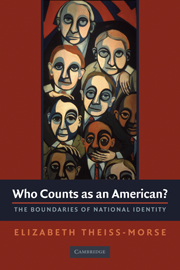Book contents
- Frontmatter
- Contents
- List of Figures
- List of Tables
- Preface
- 1 The Need for a Social Theory of National Identity
- 2 Commitment to the National Group
- 3 The Setting of National Group Boundaries
- 4 The Desire to Help the National Group
- 5 Loyalty in the Face of Criticism
- 6 Is National Identity Good or Bad?
- Appendix
- References
- Index
6 - Is National Identity Good or Bad?
Published online by Cambridge University Press: 05 June 2012
- Frontmatter
- Contents
- List of Figures
- List of Tables
- Preface
- 1 The Need for a Social Theory of National Identity
- 2 Commitment to the National Group
- 3 The Setting of National Group Boundaries
- 4 The Desire to Help the National Group
- 5 Loyalty in the Face of Criticism
- 6 Is National Identity Good or Bad?
- Appendix
- References
- Index
Summary
During the 2008 presidential election campaign, the question of whether the two major candidates were American enough to be president was raised on the campaign trail and in major media outlets. The questioning of John McCain's Americanness arose from his having been born in the Panama Canal Zone in 1936. The Constitution of the United States says in Article II, Section 1, that “No person except a natural born Citizen … shall be eligible to the Office of President.” Did McCain's circumstances fit the Constitution or the various laws and interpretations that have occurred since the founding of the country? The debate over the issue never became very heated (see, e.g., Hulse 2008a, 2008b; Liptak 2008), and Americans seemed loath to question the Americanness of McCain given his war-hero image. Democrats did not pursue the issue, nor did it have much of a life in the blogosphere.
The same cannot be said of the sometimes explicit, but often implicit, questioning of Barack Obama's Americanness. Jeffrey Frederick, the Virginia GOP chair, rallied his volunteers by associating Obama with Osama bin Laden. The volunteers jumped at the bait: “‘And he won't salute the flag,’ one woman added, repeating another myth about Obama. She was quickly topped by a man who called out, ‘We don't even know where Senator Obama was really born’” (Tumulty 2008). Obama was born in Hawaii, but the “foreigner” tag sticks with him.
- Type
- Chapter
- Information
- Who Counts as an American?The Boundaries of National Identity, pp. 163 - 186Publisher: Cambridge University PressPrint publication year: 2009



